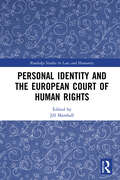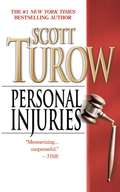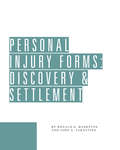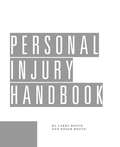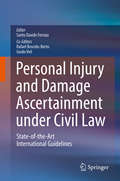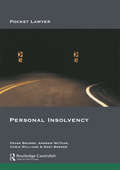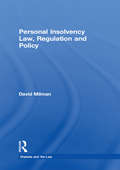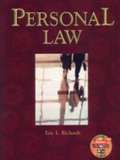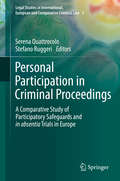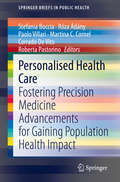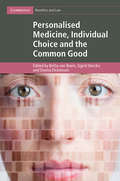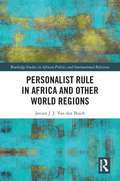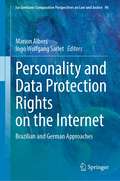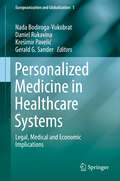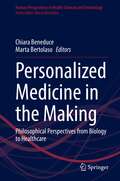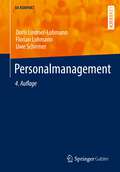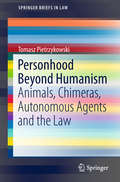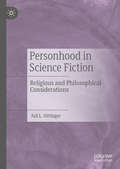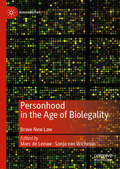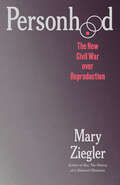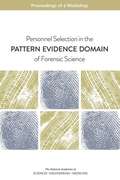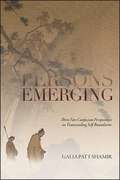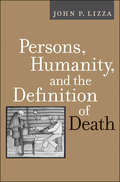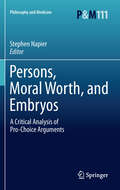- Table View
- List View
Personal Identity and the European Court of Human Rights (Routledge Studies in Law and Humanity)
by Jill MarshallIn this new and burgeoning field in legal and human rights thought, this edited collection explores, by reference to applied philosophy and case law, how the European Court of Human Rights (ECtHR) has developed and presented a right to personal identity, largely through interpretation of Article 8 of the European Convention on Human Rights. Divided into three parts, the collection interrogates: firstly, the construction of personal identity rights at the ECtHR; secondly, whose identity rights are protected; and thirdly, the limits of identity rights. The collection is the first in the Routledge Studies in Law and Humanity series. Contributions from nine leading and emerging legal scholars from the UK, Ireland and continental Europe explore how the right has developed, rights to identity and marriage, LGBTI+, persons with disabilities, religious and cultural issues and critical perspectives on the social construction and framing of the right. The collection is primarily aimed at scholars and advanced students, particularly of human rights law and its theory, Jurisprudence and Philosophy of Law, and those interested in ECtHR jurisprudence, and those interested in the connection between theories of inclusion, belonging and rights, including human rights lawyers.
Personal Injuries
by Scott TurowA compelling and convincing account of a long-term government-run sting operation.
Personal Injury Forms: Discovery & Settlement
by John Tarantino Ronald BankstronKeep your cases moving forward. Establishing proven routines for processing your tort cases can boost your efficiency and your effectiveness. Tools for systematizing your caseload may be found in Ron Bankston and John Tarantino's Personal Injury Forms: Discovery & Settlement. Faster Settlements This book and disc package offers time-tested forms and advice on how to use them. The first half of the book focuses on tools applicable to all types of personal injury litigation; the second half covers the following types of cases: Auto accidents Insurance bad faith Liquor liability Medical malpractice Police assault & battery Premises security Products liability Slip & fall Workers' compensation And more In personal injury litigation, mismanagement and inefficiency often plague the early phases of case development. Over 300 carefully selected forms, checklists, questionnaires, complaints, and memoranda will help you organize and economize your personal injury work. Improve the speed and effectiveness of your intake, investigation, pleading, discovery, and settlement with these practice-proven tools: Model interrogatories Deposition checklists Interview questionnaires Case evaluation checklists Client, witness and expert letters Sample complaints Memoranda Motions Settlement letters The authors' years of experience have yielded practical advice and techniques for overcoming common problems. Troublesome issues are analyzed with case authority, and case-specific liability hurdles are tackled. The following are just a few of the helpful tips you will learn from Personal Injury Forms: How to spot clients who are likely to be difficult ... before they cause you problems. Section 115 Understanding which cases not to accept. Section 116 Discovery motions help you move around common obstacles. Section 753 How to refute defense claims of malingering. Section 118 Model client letters and attachments, like a "what to expect" letter with a special damages record, improve client communication and encourage client assistance. Section 133 Keep your cases moving forward. Establishing proven routines for processing your tort cases can boost your efficiency and your effectiveness. Tools for systematizing your caseload may be found in Ron Bankston and John Tarantino's Personal Injury Forms: Discovery & Settlement.
Personal Injury Handbook
by Larry BoothPersonal Injury Handbook As insurers grow more miserly, it is more important than ever to carefully select, investigate, prepare, and prosecute your cases. Larry and Roger Booth's Personal Injury Handbook is loaded with valuable practice aids and tips that will help you maximize the value of each of your cases. You receive over 140 forms and 60 checklists specific to 14 types of cases: * Motor vehicle accidents * Railroad crossing accidents * Premises liability * Premises security * Construction site accidents * Electrocution accidents * Dog bites * Collisions with livestock * Products liability * Auto crashworthiness * Medical malpractice * Sexual molestation * Insurance bad faith * Industrial equipment
Personal Injury and Damage Ascertainment under Civil Law
by Guido Viel Rafael Boscolo-Berto Santo Davide FerraraThis volume serves to provide an international overview of personal injury compensation in different geographical areas (15 countries already included), with a special focus on the methods used to ascertain the injury and the related damages. It also goes on to clarify the logical and methodological steps required for a sequential, in-depth ascertainment of any traumatic event and the related personal damage, both pecuniary and non-pecuniary. Personal injury is a legal term for an injury to thebody, mind or emotions suffered by the plaintiff under tort and/or civil lawregulations. Damages related to the injury can be pecuniary or non-pecuniary innature. Although several comparative studies and research projects on tort andcivil law and personal injury claims aimed at developing new tools forpromoting harmonization of private law have been performed at an internationallevel, heterogeneity and divergences still exist in the definition andcompensation of personal injury and damage across different national legislativesystems. The starting point for any awarding procedure should be a medical, or rather amedico-legal, assessment to gain evidence on the trauma or event causing theinjury, the mechanism of injury, the pre-existing health status of the injuredparty, and the health consequences of the injury (temporary and permanentimpairment, work incapacity, etc. ). In order to pursue the ultimate goal of aninternational harmonization of personal injury compensation, it is of upmostimportance to define the quality requirements for the medico-legalascertainment methodology, which are essential for guaranteeing theobjectivity, rigor, and reproducibility of the data and the evidence collectionprocedure. Currently, there are no supra-national medico-legal guidelines dealingwith the ascertainment methodology of personal injury and damage under tort andcivil law.
Personal Insolvency
by Frank BrumbyThe Pocket Lawyer series is designed for members of the public who want 'how to' guidance in situations that would normally require expert advice.Each title: written by experts in their field contains all the information you need in one book has an accessible and user-friendly layout and structure is supported by a companion website providing free updates and ready-to-use documents and letters
Personal Insolvency Law, Regulation and Policy (Markets and the Law)
by David MilmanAs the radical reforms contained in the Enterprise Act 2002 have come fully on-stream, Personal Insolvency Law has become a major focus of attention. At the same time, all evidence points to increasing levels of personal debt with the consequential rise in bankruptcies. Personal Insolvency Law, Regulation and Policy therefore provides a timely evaluation of the current state of English law in this important area. The volume presents a critical analysis of the regimes of bankruptcy and individual voluntary arrangement in the context of current policy goals. It examines the impact of the Insolvency Act 2000 and the Enterprise Act 2002, and discusses the treatment of bankruptcy within the global economy. The book will be a valuable guide for students and academics engaged in the study of this increasingly important branch of private law. The study will also be of value to practitioners and policy makers.
Personal Law
by Eric L. RichardsInformative overview of personal law issues that are of practical importance in our lives.
Personal Participation in Criminal Proceedings: A Comparative Study of Participatory Safeguards and in absentia Trials in Europe (Legal Studies in International, European and Comparative Criminal Law #2)
by Stefano Ruggeri Serena QuattrocoloThis book presents a comprehensive analysis of personal participation in criminal proceedings and in absentia trials. Going beyond the accused-centred perspective of default proceedings, it not only examines the consequences of absence in various types of criminal proceedings, but also the fair trial safeguards allowing personal contributions during trials, as well as in pre-trial inquiries, higher instances and transborder procedures. By pursuing an interdisciplinary approach and employing comparative-law methodologies, the book presents a cross-section of twelve European criminal justice systems with regard to the requirements set forth by constitutional, international and EU law.
Personal Security: A Guide for International Travelers
by Tanya SpencerMaintain peace of mind while you are working or living abroad wherever and however you travel. As an international traveler, you know there are risks. But are you doing everything you can to protect yourself and your belongings? Whether you are traveling for work or pleasure, Personal Security: A Guide for International Travelers enables you to pre
Personalised Health Care: Fostering Precision Medicine Advancements for Gaining Population Health Impact (SpringerBriefs in Public Health)
by Stefania Boccia Paolo Villari Róza Ádány Martina C. Cornel Corrado De Vito Roberta PastorinoPractitioners are increasingly adopting a personalised medicine approach to individually tailored patient care, especially disease diagnosis and treatment with the use of biomarkers. However, development and implementation of such approaches to chronic disease prevention need further investigation and concerted efforts for proper use in healthcare systems. This book provides high-quality, multidisciplinary knowledge from research in personalised medicine, specifically personalised prevention of chronic disease. It addresses different perspectives of prevention in the field, and is the outcome of a four-year work of the Personalized prevention of Chronic Disease (PRECeDI) Consortium, a multi-disciplinary and multi-professional team of experts. The Consortium jointly agreed to document and address the five aspects or domains of personalised medicine and prevention as individual chapters: Identification of biomarkers for the prevention of chronic diseaseEvaluation of predictive genomic applicationsEthico-legal and policy issues surrounding personalised medicineRoles and responsibilities of stakeholders in informing healthy individuals on their genome: a sociotechnical analysisIdentification of organisational models for the provision of predictive genomic applicationsThe book focuses on the Consortium's recommendations that are derived from each of these domains based on up-to-date evidence and research that the authors write, follow, and systematically organise and report.Personalisation of health care is, eventually, a driver of innovation in research and healthcare systems. With this SpringerBrief on Personalised Health Care: Fostering Precision Medicine Advancements for Gaining Population Health Impact, the Consortium provides further evidence of the clinical validity and utility of personalised medicine with special emphasis on the prevention of chronic diseases. The book is a useful resource for policy makers, industry and healthcare professionals, scientists, technology-sector professionals, investors, citizens, and private companies that need proper advice to realise the potential of personalised medicine.
Personalised Medicine, Individual Choice and the Common Good (Cambridge Bioethics and Law)
by Donna Dickenson Sigrid Sterckx Britta Van BeersHippocrates famously advised doctors 'it is far more important to know what person the disease has than what disease the person has'. Yet 2,500 years later, 'personalised medicine', based on individual genetic profiling and the achievements of genomic research, claims to be revolutionary. In this book, experts from a wide range of disciplines critically examine this claim. They expand the discussion of personalised medicine beyond its usual scope to include many other highly topical issues, including: human nuclear genome transfer ('three-parent IVF'), stem cell-derived gametes, private umbilical cord blood banking, international trade in human organs, biobanks such as the US Precision Medicine Initiative, direct-to-consumer genetic testing, health and fitness self-monitoring. Although these technologies often prioritise individual choice, the original ideal of genomic research saw the human genome as 'the common heritage of humanity'. The authors question whether personalised medicine actually threatens this conception of the common good.
Personalist Rule in Africa and Other World Regions (Routledge Studies in African Politics and International Relations)
by Jeroen J.J. Van den BoschThis book presents an innovative model linking insights from democratization, development and conflict studies to explain personalist behavior and their violent transitions. Based on multiple case studies from Sub Saharan Africa, the author maps and predicts regime transitions, presenting examples of how states can avoid such vicious circles of conflict and tyranny. By integrating decades of specialist literature from various subfields of political science, the book models personalist behavior, its impact on the states they govern, and their future transitions. By systematizing regime behavior (coup-proofing, gatekeeping, repression and hoarding), the model identifies the mechanics on how personalist regimes establish vicious circles of personalism and explains how exactly they end up again in authoritarianism or in new personalist tyrannies after their demise, and so seldom transition to democracy. This book will be of key interest to scholars and students of African politics, democratization and democratic consolidation, authoritarian rule and more broadly to political science, comparative politics, area studies, political leadership, peace and conflict studies and development studies.
Personality and Data Protection Rights on the Internet: Brazilian and German Approaches (Ius Gentium: Comparative Perspectives on Law and Justice #96)
by Marion Albers Ingo Wolfgang SarletThis book focuses on protection needs and new aspects of personality and data protection rights on the Internet, presenting a comprehensive review that discusses and compares international, European and national (Brazilian, German, Pakistani) perspectives. It deals with overarching questions, such as whether universal minimum standards of privacy protection can be developed or how regional data protection rights can be safeguarded and enforced extraterritorially, given the conditions of the Internet. Furthermore, the book addresses new challenges and novel rights, e. g., data retention and protection against mass surveillance, the right to be forgotten, rights to anonymity, legal issues of the digital estate or rights relating to algorithmic decision-making. Furthermore, the book explores how well-known paradigms, such as liability for personality rights violations or damages, have to be adapted in view of the significant role of intermediaries.
Personalized Medicine in Healthcare Systems: Legal, Medical and Economic Implications (Europeanization and Globalization #5)
by Nada Bodiroga-Vukobrat Daniel Rukavina Krešimir Pavelić Gerald G. SanderThis book gathers scientific contributions on comprehensive approaches to personalized medicine. In a systematic and clear manner, it provides extensive information on the methodological, technological, and clinical aspects of high-throughput analytics, nanotechnology approaches, microbiota/human interactions, in-vitro fertilization and preimplantation, and various diseases like cancer.Moreover, the book analyzes the social and legal aspects of social security systems, healthcare systems and EU law – e.g. the role of solidarity, regulatory possibilities and obstacles, justice and equality, privacy/disclosure of data, and the right to know – from an interdisciplinary perspective. Lastly, it explores the economical and ethical context in the fields of business models, intellectual property issues, the patient/physician relationship, and price discrimination.
Personalized Medicine in the Making: Philosophical Perspectives from Biology to Healthcare (Human Perspectives in Health Sciences and Technology #3)
by Marta Bertolaso Chiara BeneduceThis book offers a multidisciplinary look at the much-debated concept of “personalized medicine”. By combining a humanistic and a scientific approach, the book builds up a multidimensional way to understand the limits and potentialities of a personalized approach in medicine and healthcare. The book reflects on personalized medicine and complex diseases, the relationship between personalized medicine and the new bio-technologies, personalized medicine and personalized nutrition, and on some ethical, political, economic, and social implications of personalized medicine. This volume is of interest to researchers from several disciplines including philosophy, bio-medicine, and the social sciences.
Personalmanagement: Handlungsmaßnahmen Und Best Practices Zum Demografieorientierten Personalmanagement (BA KOMPAKT)
by Uwe Schirmer Doris Lindner-Lohmann Florian LohmannDas vorliegende Personal-Lehrbuch bietet einen Einblick in die zentralen Aufgabenfelder eines modernen Personalmanagements sowie einen umfangreichen Überblick über vertiefende Literatur zu spezifischen Themenbereichen. Ausgehend von den grundsätzlichen Zielen und Aufgaben des Personalmanagements sowie den aktuellen Tendenzen in der Personalpolitik behandeln die Autoren Personalbedarfsplanung, -beschaffung, -einsatz und -verwaltung, Entlohnung und Sozialpolitik, Personalentwicklung, -abbau und -controlling. Das Lehrbuch ist genau auf die Anforderungen (Kompetenzziele, Lehrinhalte) des Bachelor-Studiums im Studienbereich Wirtschaft der Berufsakademien und Dualen Hochschulen zugeschnitten sowie für alle betriebswirtschaftlichen Bachelorstudiengänge als Einführung für das Fach Personalmanagement geeignet. Eine Vielzahl von Abbildungen, Hintergrundinformationen und Praxisbeispielen tragen zu einer hohen Verständlichkeit der behandelten Themenfelder bei. Die enthaltenen Kontrollfragen bieten dem Leser die Möglichkeit, das eigene Verständnis direkt zu überprüfen.Für die 4. Auflage wurde das Buch ein Kapitel zum Thema Personalorganisation erweitert.
Personhood Beyond Humanism: Animals, Chimeras, Autonomous Agents And The Law (SpringerBriefs in Law)
by Tomasz PietrzykowskiThis book explores the legal conception of personhood in the context of contemporary challenges, such as the status of non-human animals, human-animal biological mixtures, cyborgisation of the human body, or developing technologies based on artificial autonomic agents. It reveals the humanistic assumptions underlying the legal approach to personhood and examines the extent to which they are undermined by current and imminent scientific and technological advances. Further, the book outlines an original conception of non-personal subjecthood so as to provide adequate normative solutions for the problematic status of sentient animals and other kinds of entities. Arguably, non-personal subjects of law should be regarded as holding one right, and only one right - the right to be taken into account.
Personhood in Science Fiction: Religious and Philosophical Considerations
by Juli L. GittingerThis book addresses the topic of personhood—who is a “person” or “human,” and what rights or dignities does that include—as it has been addressed through the lens of science fiction. Chapters include discussions of consciousness and the soul, artificial intelligence, dehumanization and othering, and free will. Classic and modern sci-fi texts are engaged, as well as film and television. This book argues that science fiction allows us to examine the profound question of personhood through its speculative and imaginative nature, highlighting issues that are already visible in our present world.
Personhood in the Age of Biolegality: Brave New Law (Biolegalities)
by Marc De Leeuw Sonja Van WichelenThis volume showcases emerging interdisciplinary scholarship that captures the complex ways in which biological knowledge is testing the nature and structure of legal personhood. Key questions include: What do the new biosciences do to our social, cultural, and legal conceptions of personhood? How does our legal apparatus incorporate new legitimations from the emerging biosciences into its knowledge system? And what kind of ethical, socio-political, and scientific consequences are attached to the establishment of such new legalities? The book examines these problems by looking at materialities, the posthuman, and the relational in the (un)making of legalities. Themes and topics include postgenomic research, gene editing, neuroscience, epigenetics, precision medicine, regenerative medicine, reproductive technologies, border technologies, and theoretical debates in legal theory on the relationship between persons, property, and rights.
Personhood: The New Civil War over Reproduction
by Mary ZieglerThe next phase of the war over reproduction in America What&’s next for the battle over abortion? Mary Ziegler argues that simply undoing Roe v. Wade has never been the endpoint for the antiabortion movement. Since the 1960s, the larger goal has been to secure recognition of fetuses and embryos as persons under the Fourteenth Amendment of the U.S. Constitution, a step that the modern antiabortion movement argues would make liberal abortion laws unconstitutional. Personhood chronicles the internal struggles and changing ideas about race, sex, religion, war, corporate rights, and poverty that shaped the personhood struggle over half a century. The book explores how Americans came to take for granted that fetal personhood requires criminalization and suggests that other ways of valuing both fetal life and women&’s equality might be possible. Ziegler ultimately shows that the battle for personhood has long been about more than abortion: it has aimed to overhaul the regulation of in vitro fertilization, contraception, and the behavior of pregnant women; change the meaning of equality under the law; and determine how courts decide which fundamental rights Americans enjoy. This book is necessary reading for anyone seeking to understand the era launched by the reversal of Roe.
Personnel Selection in the Pattern Evidence Domain of Forensic Science: Proceedings of a Workshop
by Engineering Medicine National Academies of SciencesIn July 2016 The National Academies of Sciences, Engineering, and Medicine convened a workshop with the goal of bringing together industrial and organizational (I-O) psychologists, experts on personnel selection and testing, forensic scientists, and other researchers whose work has a nexus with workforce needs in the forensic science field with a focus on pattern evidence. Participants reviewed the current status of selection and training of forensic scientists who specialize in pattern evidence and discussed how tools used in I-O psychology to understand elements of a task and measure aptitude and performance could address challenges in the pattern evidence domain of the forensic sciences. This publication summarizes the presentations and discussions from the workshop.
Persons Emerging: Three Neo-Confucian Perspectives on Transcending Self-Boundaries (SUNY series in Chinese Philosophy and Culture)
by Galia Patt-ShamirOffers three neo-Confucian understandings of broadening the Way as broadening oneself, through an ongoing process of removing self-boundaries.Persons Emerging explores the renewed idea of the Confucian person in the eleventh-century philosophies of Zhou Dunyi, Shao Yong, and Zhang Zai. Galia Patt-Shamir discusses their responses to the Confucian challenge that the Way, as perfection, can be broadened by the person who travels it. Suggesting that the three neo-Confucian philosophers undertake the classical Confucian task of "broadening the way," each proposes to deal with it from a different angle: Zhou Dunyi offers a metaphysical emerging out of the infinitude-finitude boundary, Shao Yong emerges out of the epistemological boundary between in and out, and Zhang Zai offers a pragmatic emerging out of the boundary between life and death.Through the lens of these three Song-period China philosophers, the idea of "transcending self-boundaries" places neo-Confucian philosophies within the global philosophical context. Patt-Shamir questions the Confucian notions of person, Way, and how they relate to human flourishing to highlight how the emergence of personhood demands transcending metaphysical, epistemological, and moral self-boundaries.
Persons, Humanity, and the Definition of Death (Bioethics)
by John P. LizzaIn this riveting and timely work, John P. Lizza presents the first comprehensive analysis of personhood and humanity in the context of defining death. Rejecting the common assumption that human or personal death is simply a biological phenomenon for biologists or physicians to define, Lizza argues that the definition of death is also a matter for metaphysical reflection, moral choice, and cultural acceptance. Lizza maintains that defining death remains problematic because basic ontological, ethical, and cultural issues have never been adequately addressed. Advances in life-sustaining technology and organ transplantation have led to revision of the legal definition of death. It is generally accepted that death occurs when all functions of the brain have ceased. However, legal and clinical cases involving postmortem pregnancy, individuals in permanent vegetative state, those with anencephaly, and those with severe dementia challenge the neurological criteria. Is "brain death" really death? Should the neurological criteria be expanded to include individuals in permanent vegetative state, with anencephaly, and those with severe dementia? What metaphysical, ethical, and cultural considerations are relevant to answering such questions?Although Lizza accepts a pluralistic approach to the legal definition of death, he proposes a nonreductive, substantive view in which persons are understood as "constituted by" human organisms. This view, he argues, provides the best account of human nature as biological, moral, and cultural and supports a consciousness-related formulation of death. Through an analysis of legal and clinical cases and a discussion of alternative concepts of personhood, Lizza casts greater light on the underlying themes of a complex debate.
Persons, Moral Worth, and Embryos
by Stephen Napier"Bioethicists have achieved consensus on two ideas pertaining to beginning of life issues: (1) persons are those beings capable of higher-order cognition, or self-consciousness, and (2) it is impermissible to kill only persons. As a consequence, a consensus is reached regarding the permissibility of both destroying human embryos for research purposes and abortion. The present collection aims to interact critically with this consensus. Authors address various aspects of this 'orthodoxy'. Issues discussed include: theories of personhood and in particular the role of thought experiments used in support of such theories; the notion of an intrinsic potential and the moral relevance of having one; new formulations of the virtue argument against abortion rights; four-dimensionalism and abortion; the notion of moral status and who (or what) has it; scientific accounts of what a human being is, as well as addressing empirical evidence of fetal consciousness; and analysis of the public policy implications given the epistemic status of pro-choice arguments. Given the issues discussed and that the arguments in critical focus are fairly new, the collection provides a novel, comprehensive, and rigorous analysis of contemporary pro-choice arguments."
